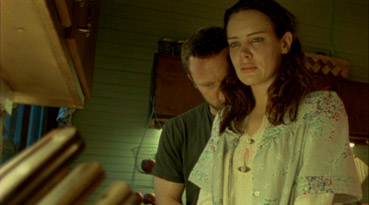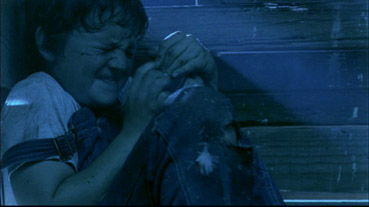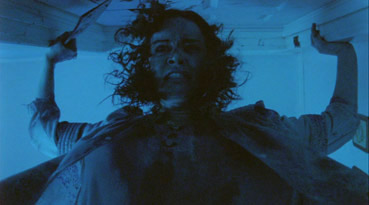|
If you're looking for a cinematic embodiment of sensitivity to real world suffering on the part of modern filmmakers then I'd seriously give The Cradle Will Fall, aka Baby Blues, a wide berth. Apparently based on actual events, it tells the story of a mother who suffers a postpartum breakdown, kills her newborn baby and then turns on her young children. If you've got a thing about kids being placed in mortal peril for our entertainment then you're certainly going to have problems with a film in which they are threatened with knives, guns and hatchets, and even a combine harvester. Well, more than threatened, if you must know. And if you're the sort of viewer who switched off the DVD after the little girl got shot in John Carpenter's masterful Assault on Precinct 13, then do yourself a big favour, don't even put this one in the player.
Obviously, some are going to have a real issue to the very concept of turning the tragic true-life consequences of severe postnatal depression into a slasher movie entertainment, complete with a monster mother (she's never humanised with a name, even in the credits) and terrified young innocents to act as victims. It really is worth knowing about this up front to save you the trauma of being unspeakably outraged later. But assuming you're OK with this, how does the movie play on its own merits? Well, there's good and not-so-good to contend with here, and a couple of borrowings that should have the eyes of genre fans popping at the brazen cheek of first-time feature directors Lars Jacobson and Amardeep Kaleka.

Technically the film has plenty going for it, quickly building an air of tangible menace and establishing the very real threat to young but resourceful Jimmy by sacrificing his newborn sibling and younger brother Sammy at an early stage. Being a child provides no survival guarantees here, and in that respect all the usual bets are off. Thus, when little Cathy hides in the hay and mother comes looking for her with a pitchfork, you'll have good reason to start sucking air through clenched teeth.
But this is a monster whose transformation from devoted mother to wild-eyed psycho demands more explanation and screen time than it gets here. Well, some explanation and screen time would have been nice. If you thought Jack Torrance made a speedy journey from disgruntled writer to axe-wielding maniac in The Shining then you ain't seen nothing. Here, Mom looks whacked out from the moment we meet her, weary and wide-eyed in a way that worries but doesn't seriously disturb her family, which can't help but suggest she's been that way for some considerable time. Small pointers are dropped along the way about hubby's repeated absence, his possible infidelity and the pressures of raising a family when he is not around, but none are explored on anything more than a throwaway level. We thus never get to know or even meet the stable and happy woman that Mom presumably once was and are encouraged to regard her as a threat from the very start. The hows and whys of her condition we're left to unpick for ourselves.
With Dad away on another haulage job and Mom too far gone to prompt the audience sympathy she probably deserves, we're encouraged instead to connect with the kids, not because we bond with them as characters but because they're kids and they've sweet and never done anything to hurt anyone. I know it's bouncing back to an old established favourite, but there was a very good reason for those early bonding scenes in The Exorcist, which so effectively connected us to Regan and her mother before things turned demonic. There's none of that here. They're kids. They're in danger. She's bonkers. Sympathise. Get scared.

Where the film claws back some points is in the performances. Colleen Porch has attracted some positive press for her portrayal of Mom, but although she certainly throws herself into the role, this is one element that plays to genre convention, where killers are expected to be wide-eyed and feral and bonkers. In contrast, Joel Bryant is effectively low-key as her soft-spoken husband and the kids are more naturalistic than you'd expect for an American horror movie, particularly Ridge Canipe, who as the desperate and terrified Jimmy is effectively required to carry the movie's second half.
In some ways, The Cradle Will Fall is a psychological thriller that's been stripped of its psychology, leaving only a threadbare stalk-and-slash plot and the sense that good half-hour of intended character and narrative build-up was planned but never filmed. The young age of the victims aside, the second half of the story rides the bus of convention, right down to the expected help-at-hand who is killed before he can do anything useful and the bad feelings that point Dad towards home so that we can wonder if he'll get there in time to save any of his kids from Mum's madness. Small borrowings are dotted throughout, but The Shining gets more blatantly pilfered, most evident in the above-mentioned Dick Hallorann stand-in and particularly in an exact replication of one of Kubrick's most instantly recognisable shots in a close to identical situation for the character involved.
The Cradle Will Rock is a film whose atmosphere, technical proficiency and taste-busting subject matter are undermined by characters who are in conflict before we get the chance to really know them. What's left is an exercise in the mechanics of film tension at the expense of character and story, which given appropriate development in the early stages could have made the second half a lot more involving and nerve-wracking than it is. It might also have provided some welcome insight into Mom's emotional transformation and subsequent actions, which although effectively alluded to in the early scenes, end up reduced to the tabloid simplicity of 'depressed mother of four goes nuts and attacks kids'.
I've not been able to confirm this, but I suspect that The Cradle Will Fall was shot on HD rather than film, but the image has been subjected to so much post-production tinkering that it's tricky to be sure just what the picture looked like before the tweaking. There's hardly a scene that hasn't had had the colour or contrast or both fiddled around with, sometimes to an excessive and distracting degree and often with little sense of purpose or continuity. Within these restrictions, this is a decent enough transfer, with contrast largely solid and colours clear, though the sharpness is weaker in some shots than in others – another artistic decision or a glitch with the original footage? The framing is 1.78:1 and the picture is anamorphically enhanced.

The only soundtrack option is Dolby 5.1 surround, but there's precious little going on at the back or the sides, though intermittently some stereo separation was detectable. It's as clear as you'd expect from a modern soundtrack, but nothing to write home about.
One thing worth noting is that despite the box and menu title of The Cradle Will Fall, the title on the film itself remains Baby Blues, at least on the review DVD, which will doubtless prompt a few unwary viewers to take it straight back to the shop and complain that the wrong film is on the disc.
Only a Trailer (2:42), which ironically provides more information on Mom's condition than the film itself
If you like your slasher thrillers free of build-up or psychological complications then you may well have a fine time with this – certainly the person I watched it with was suitably creeped out. But despite its considerable technical proficiency and decent performances, the lack of psychological and character depth robs it of the substance it cries out for, and in the process turns a complex medical condition into a simple trigger for murderous mayhem. A bare bones disc for a film that only runs for 74 minutes, which although 9 minutes short of the IMDb listed running time was passed uncut by the BBFC.
|